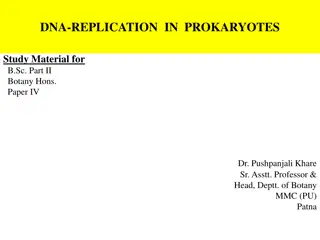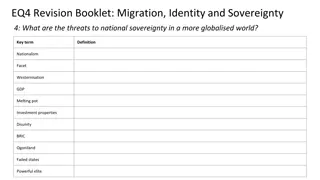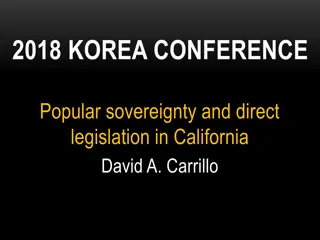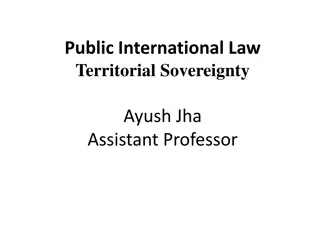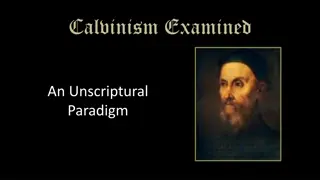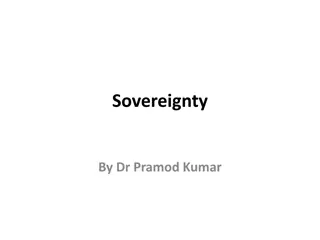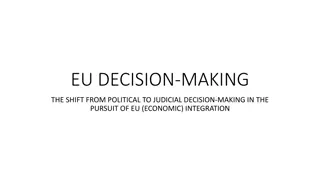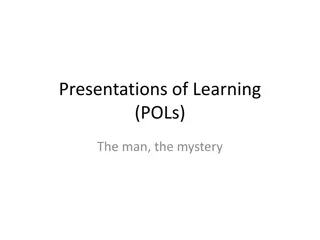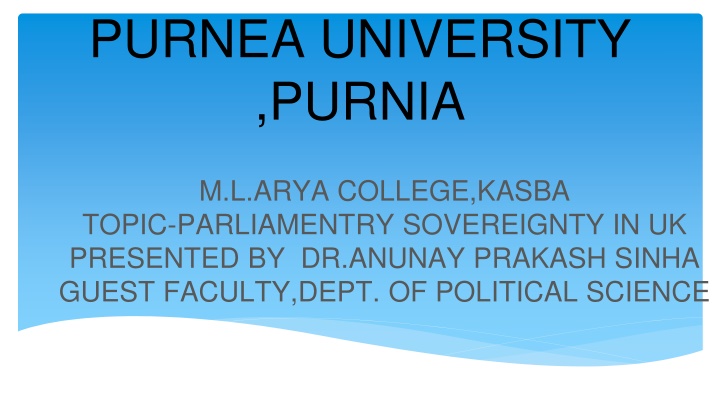
Parliamentary Sovereignty in the UK: Views and Unresolved Questions
Explore the concept of parliamentary sovereignty in the UK through the perspectives of jurists like Sir William Blackstone and Scottish judge Thomas Cooper. Delve into the debate surrounding the principle of unlimited sovereignty of Parliament, its impact on laws and the European Union, and the erosion of Parliament's power over time.
Download Presentation

Please find below an Image/Link to download the presentation.
The content on the website is provided AS IS for your information and personal use only. It may not be sold, licensed, or shared on other websites without obtaining consent from the author. If you encounter any issues during the download, it is possible that the publisher has removed the file from their server.
You are allowed to download the files provided on this website for personal or commercial use, subject to the condition that they are used lawfully. All files are the property of their respective owners.
The content on the website is provided AS IS for your information and personal use only. It may not be sold, licensed, or shared on other websites without obtaining consent from the author.
E N D
Presentation Transcript
PURNEA UNIVERSITY ,PURNIA M.L.ARYA COLLEGE,KASBA TOPIC-PARLIAMENTRY SOVEREIGNTY IN UK PRESENTED BY DR.ANUNAY PRAKASH SINHA GUEST FACULTY,DEPT. OF POLITICAL SCIENCE
According to the jurist Sir William Blackstone, "It has sovereign and uncontrollable authority in making, confirming, enlarging, restraining, abrogating, repealing, reviving, and expounding of laws, concerning matters of all possible -------
denominations, ecclesiastical, or temporal, civil, military, maritime, or criminal ... it can, in short, do every thing that is not naturally impossible." A different view has been taken by the Scottish judge Thomas Cooper, 1st Lord Cooper of Culross.
When he decided the 1953 case of MacCormick v. Lord Advocate as Lord President of the Court of Session, he stated, "The principle of unlimited sovereignty of Parliament is a distinctively English principle and has no counterpart in Scottish constitutional law."
Thus, the question of Parliamentary sovereignty appears to remain unresolved. Parliament has not passed any Act defining its own sovereignty. The European Union (Withdrawal Agreement) Act 2020 states "It is recognised that the Parliament of the United Kingdom is sovereign."
Parliament's power has often been eroded by its own Acts. Acts passed in 1921 and 1925 granted the Church of Scotland complete independence in ecclesiastical matters. From 1973 to 2020, its power had been restricted by membership of the European Union, which has the power to make laws enforceable in each member state.
One well-recognised consequence of Parliament's sovereignty is that it cannot bind future Parliaments; that is, no Act of Parliament may be made secure from amendment or repeal by a future Parliament-------
For example, although the Act of Union 1800 states that the Kingdoms of Great Britain and Ireland are to be united "forever," Parliament permitted southern Ireland to leave the United Kingdom in 1922.





